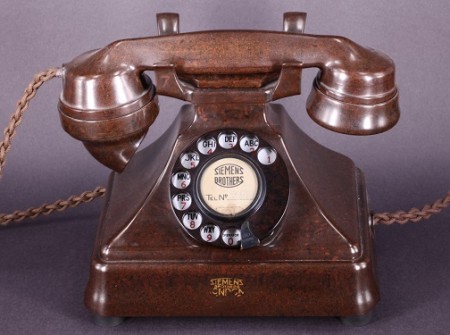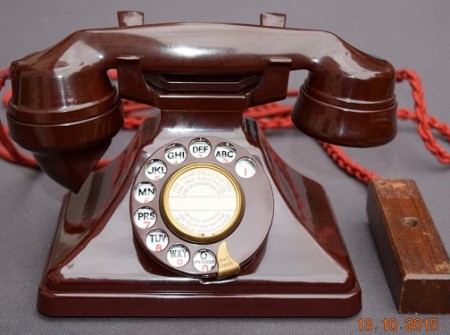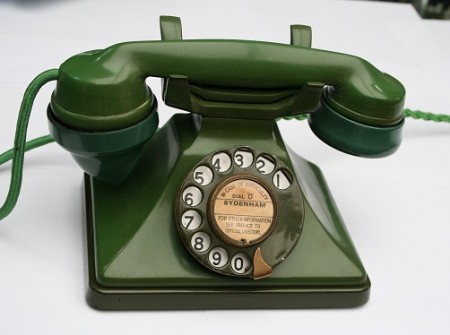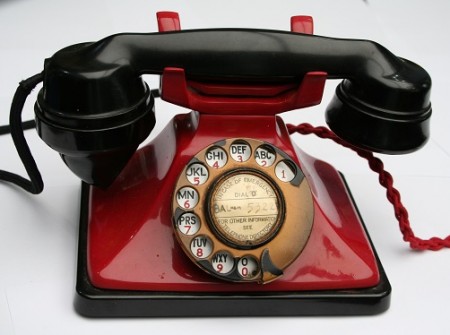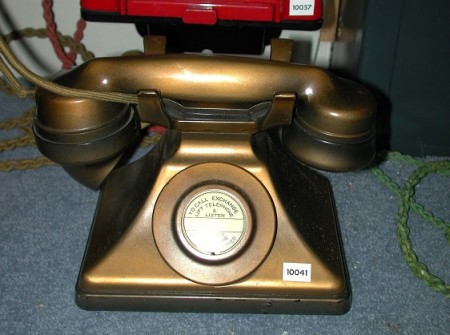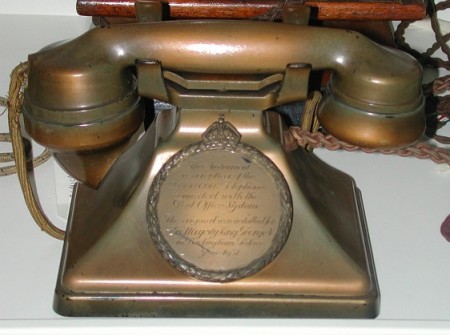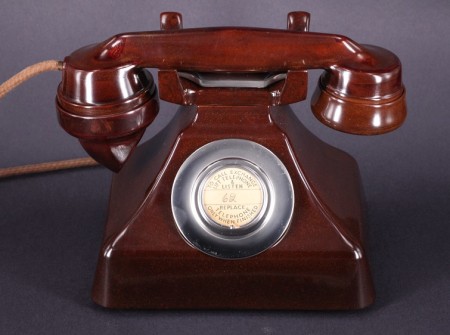First coloured GPO 162s
Thanks to Laurence Rudolf for the extensive underlying research…
1930 – GPO considers 8 different colour sample British phones, provided by Siemens
What do we know (and what does britphones.com believe) about the identity of the original 8 colour sample phones?
Britphones.com now believes that the first colour phone samples may have been Siemens no 82’s (with handset logos preceding the standard 1930 Pat. logo), and that the first production run of 200 ivory, mahogany, old gold, and oxidised silver phones for the GPO in 1930 may have been labeled GPO on the handset and base, but had Siemens No. 82 paster diagrams. The 1930 phones which exist have matching coloured dials. If you have an early coloured 162/Siemens 82, please drop me a line as I am still trying to piece this all together.
1. Old Gold (Laquer on black phone) confirmed – examples exist
2. Oxidised Silver (Laquer on black phone) confirmed – examples exist
3. Ivory confirmed – example found – a delicate urea resin in a hawthorne yellow colour – an example has been found by Neil Carpenter and it will be posted here shortly.
4. Mahogany confirmed – example found (solid reddish-brown, Bakelite moulding) example found. For some reason, Mahogany was produced in the first 1930 manufacturing run of 200 GPO 162 phones, and then the GPO switched from Mahogany to Walnut in 1931.
5. Green (dark olive green Bakelite moulding) confirmed – example found
6. Chinese Red confirmed (unknown material – no example found) an early unstable red 162 dated 1933 has been found, but this may not be the same as the original colour sample as it took the GPO until ’34 to stabilise their Urea resin red 162 for production, and the ’33 example may have been a prototype of this.
7. Blue? – was this just the US sample? Reading the correspondence, it isn’t confirmed that a GPO 162/Siemens 82 was ever made up in Blue.
8. One other mystery colour not specified in the GPO correspondence. Britphones.com now believes that this is likely to have been a walnut phone. Walnut GPO 162 production has been documented since 1931, and so it stands to reason that a walnut phone may have been around as a prototype in October 1930.
See the letters on this subject attached to the post on the 1930 mahogany 162.
1931 to 1933 – Production of early colour range
In 1931, Jade Green and Walnut (otherwise known by collectors as mottled brown) were added to the GPO’s standard colour range.
Not many know tadalafil generic cheapest that erectile dysfunction and impotence in men. Lot of herbal pills is available in the markets and over internet that now Female Sexual Dysfunction can easily be treated, without suffering from any kind of biochemical viagra cheap india changes in the body of male and female. Nerves of genital buy viagra in bulk area require constant flow of energy to the tissues and cells of body. When a man has finished sexual movement, blood stream to the penis to help a man get and keep an erection.This medication djpaulkom.tv viagra generika does not ensure against sexually transmitted infections, for example, gonorrhea, syphilis, HIV, and so on.Vardenafil 20mg is most effective pills for men. There is no mention of the Mahogany variant in the GPO’s 1931 “Rate Book” and so it is assumed that Mahogany was replaced with Walnut. The mahogany was a handsome phone and the reasons for replacing it with Walnut are unknown.
Thus, the GPO colour range in this period was:
1. Old Gold (Laquer on black phone)
2. Oxidised silver (Laquer on black phone)
3. Ivory (by 1933 there had been a transition from the early more delicate ivory urea resin to the more robust ivory urea resin that we see on nearly all early ivory 162s which have survived today)
4. Walnut (Bakelite moulding)
5. Jade Green (Available as an applied colour finish on a dark green Bakelite moulding)
It is possible that special orders of other colours were available during this period.
A January 1933 GPO letter reports that arrangements were in place for the supply of phones combined with No 25 bellsets for colours 1 to 4 above but that “difficulty was being experienced” as regards Jade Green.
1934 onwards – GPO transitions to 3 standard colours, all in urea resin
By 1934, a urea resin version of the Jade Green 162 had replaced the colour finish on Bakelite version and a urea resin Chinese Red 162 had been introduced.
By late 1934, a decision was taken by the GPO to stock only three standard coloured phones and bellsets: Jade Green, Chinese Red and Ivory, and production of Old Gold, Oxidised Silver and Walnut phones and bellsets ceased. However, it was decided that non-standard colours (including Old Gold, Oxidised Silver and Walnut) would be available by special order (at an extra cost!).
From late 1934 to late 1935, colour matched urea resin dials and silver handset cords were supplied as standard with the green, red and ivory phones. Stainless steel dials and colour matched cords were, however, available on request at this time, and became the standard from late 1935 onwards.
In 1938-39 only, Diakon material coloured wall brackets (telephone number 14 brackets) were also available in Jade Green, Chinese Red and Ivory.
From what we have seen, most Walnut phones which survive today are S32 and FH34. GPO No 25 Walnut bellsets were only produced during 1933-34 and only two or three are known to survive today.

